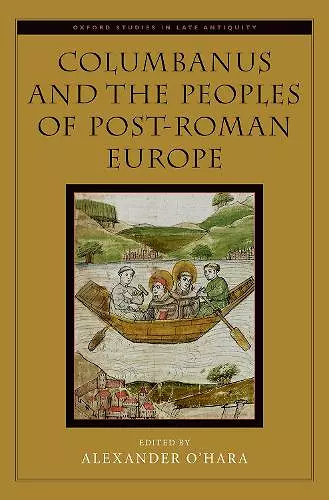Columbanus and the Peoples of Post-Roman Europe
Format:Hardback
Publisher:Oxford University Press Inc
Published:24th May '18
Currently unavailable, and unfortunately no date known when it will be back

The period 550 to 750 was one in which monastic culture became more firmly entrenched in Western Europe. The role of monasteries and their relationship to the social world around them was transformed during this period as monastic institutions became more integrated in social and political power networks. This collected volume of essays focuses on one of the central figures in this process, the Irish ascetic exile and monastic founder, Columbanus (c. 550-615), his travels on the Continent, and the monastic network he and his Frankish disciples established in Merovingian Gaul and Lombard Italy. The post-Roman kingdoms through which Columbanus travelled and established his monastic foundations were made up of many different communities of peoples. As an outsider and immigrant, how did Columbanus and his communities interact with these peoples? How did they negotiate differences and what emerged from these encounters? How societies interact with outsiders can reveal the inner workings and social norms of that culture. This volume aims to explore further the strands of this vibrant contact and to consider all of the geographical spheres in which Columbanus and his monastic communities operated (Ireland, Merovingian Gaul, Alamannia, Lombard Italy) and the varieties of communities he and his successors came in contact with -- whether they be royal, ecclesiastic, aristocratic, or grass-roots.
the whole of Columbanus and the Peoples of Post-Roman Europe ought to be essential reading for any researchers of these centuries. * Erica Steiner, University of Sydney, Journal of the Australian Early Medieval Association *
[C]ontains contributions from nearly all the leading scholars active in the field of Columbanian studies. The work is organized around the theme of the various ethnic groups – the gentes – that interacted with the saint or his monasteries. * Matthew Mattingly, Early Medieval Europe *
If all the volumes arising from these conferences are as excellent as this one, the scholarly world will be blessed. * Nathan J. Ristuccia, Church History *
[this book] certainly advances the state of knowledge with some fine examples of careful revision and probing. It is thus a welcome addition to the scholarship on a fascinating historical and hagiographical figure. * Diarmuid Ó Riain, Journal of Ecclesiastical History *
Without question, O'Hara's Columbanus and the Peoples of Post-Roman Europe provides a substantial leap forward, most immediately for scholarship on Columbanus himself, and more broadly for this caliginous era of late antique Western/European history...Indeed, what this volume demonstrates above all is how much there is yet to learn, and how fruitful a field of research Columbanus studies remain. * Kristen Carella, Assumption College, Speculum *
From a scholarly perspective, there is much here of great value to the study of this Irish and European saint's background, career and legacy, for which the editor and contributors should be congratulated. But the book also has a broader, contemporary message. * Patrick Wadden, Belmont Abbey College, The English Historical Review *
Each contribution is insightful and many offer valuable reassessments of the sources for Columbanus and his legacy in Western Europe; the volume as a whole is tightly edited and remarkably cohesive. * Patrick Gleeson, Queen's University Belfast, The Society for Medieval Archaeology *
The book is rich in content, and innovative and comprehensive in its approach. Each contribution is accompanied by an up-to-date bibliography and manages to apply new conceptual tools to older problems of Columbanian scholarship. The reader will find much that is of general interest for the study of the period and will gain considerable insight into the dynamics of intergroup relationships during an important phase of European history. * Carlo Cedra, History Ireland *
The authors have carefully and creatively teased out the well-known documents to deepen our understanding of this period. Many of the essays also reinforce and nuance ideas across multiple chapters [...] Each essay also includes an up-to-date bibliography that will be invaluable to scholars wanting to explore these topics. This is an important volume of well-written essays that contribute much to the field and is highly recommended * The Medieval Review *
In this wonderful collection of essays the reader travels with Columbanus through the Christian West, from Ireland to Brittany, from Northern Gaul to the Rhine, Bavaria, Alamannia, and Italy. Through the great Irishman's encounters with secular and ecclesiastical elites, with various religious cultures, Roman traditions, post-Roman states and peoples, this volume illuminates the profound changes that characterize the transition from the ancient to the medieval world. * Helmut Reimitz, Princeton University *
The book is rich in content, and innovative and comprehensive in its approach. Each contribution is accompanied by an up-to-date bibliography and manages to apply new conceptual tools to older problems of Columbanian scholarship. The reader will find much that is of general interest for the study of the period and will gain considerable insight into the dynamics of intergroup relationships during an important phase of European history. * Carlo Cedro, History Ireland *
ISBN: 9780190857967
Dimensions: 236mm x 157mm x 33mm
Weight: 590g
344 pages